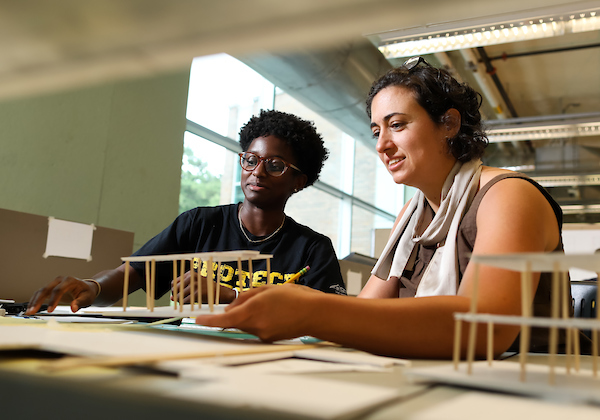Architecture
Learn more about Architecture
Admission Requirements
Students seeking entry to the lower division of the B.ARCH program as freshmen must first be accepted to KSU and in addition must have:
- 3.0 High School GPA
- And either the minimum SAT OR minimum ACT scores:
- SAT minimums: EBRW 500 and Math 570
- ACT minimums: 18 English or Reading sub-score, 23 Math sub-score
Current KSU students may apply for a Change of Major to Architecture. The following conditions must be met for acceptance:
- 24 KSU credit hours earned
- 2.5 KSU GPA
- Ready to take MATH 1113 or higher upon acceptance
Transfer students seeking entry to the lower division of the B.ARCH program must first be accepted to KSU and in addition must have:
- 2.5 College GPA
- Completed MATH 1111 (or higher) and ENGL 1101 with a minimum grade of “C”
General Education Core IMPACTS Curriculum Recommendations for this Major
M: Students should take MATH 1113 or higher.
T: Students should take MATH 1179 or higher.
T: Select two course pairs from the following (8 Credit Hours): CHEM 1211/L, CHEM 1212/L, PHYS 1111/L*, PHYS 1112/L, PHYS 2211/L*, PHYS 2212/L, BIOL 1107/L, or BIOL 1108/L. *Students cannot take both PHYS 1111/L and PHYS 2211/L nor PHYS 1112/L and PHYS 2212/L.
Degree Progression Requirements
To progress into upper-division course work students must pass Portfolio Review. Requirements include:
- 2.5 minimum university adjusted GPA
- Meet all ARCH core course requirements of the lower division with a “C” or higher
- 2.5 minimum ARCH course GPA
- Have completed all General Education Core Curriculum courses required in the program map with a grade of “C” or higher
- Submit a portfolio of work for evaluation with a minimum score 2.5 or higher
Related Minors or Certificates Available
- Architecture Minor
Sample Classes
-
ARCH 1000: Introduction to Architecture
This course will explore theoretical and practical frameworks that inform architecture. Relevant theoretical and practical issues will be presented and discussed, allowing students to understand how fundamental parameters in design, including formal, spatial, and phenomenal factors, influence decision-making and inform critical thinking. Students shall be introduced to social and ethical stewardship that center on sustainability and socially-engaging designs.
-
ARCH 2311: Environmental Tech I -Systems Selection and Materials
This course offers lecture and practicum. It introduces selection criteria of materials and their properties relative to structural and enclosure systems. Emphasis is placed on wood, steel, masonry, and concrete structural systems. Enclosure Systems are explored in relation to various applications of existing and new materials and finishes that building systems entail within the context of sustainability.
-
ARCH 4116: Urban Planning and Design Theory
This course examines historic and current trends of urban design, development and growth. Diverse socio-economic-political and spatial issues that shape and continuously transform the physical fabric of cities, metropolitan centers, and regions are the focus of this course. The course requires critical and applied assignments, through which the students explore and understand theoretical and applied underpinnings of wide-ranging and diverse urban forms and practices.
-
ARCH 4224: Professional Practice I: Codes and Technical Documents
This course offers lecture and practicum. It introduces Standard Building Code, N.F.P.A. 101 and A.D.A and / or International Building Code. Emphasis is placed on theory of building safety, code document organization and the application of codes to actual buildings. The learning of codes is further extended by applying the code knowledge to producing an actual set of technical [contract] documentation of an assigned architectural project.












